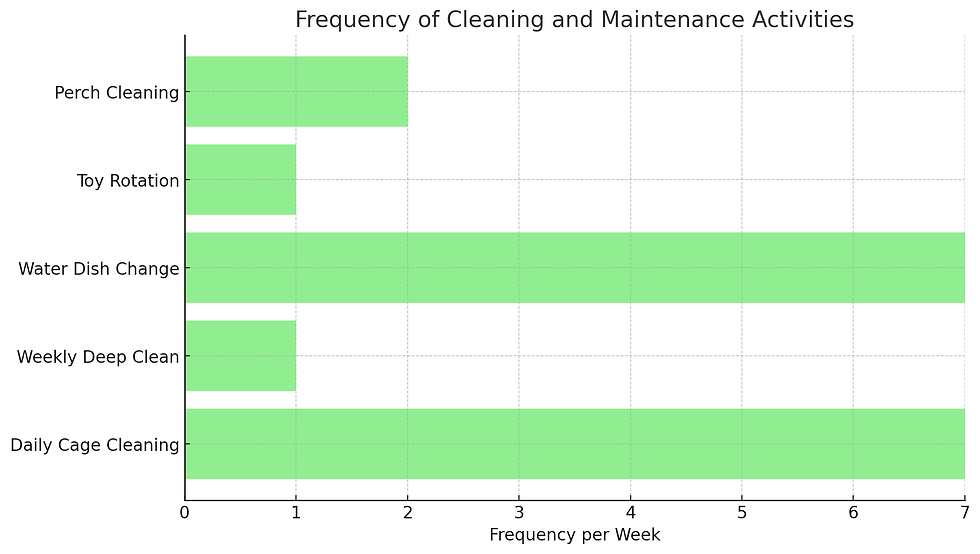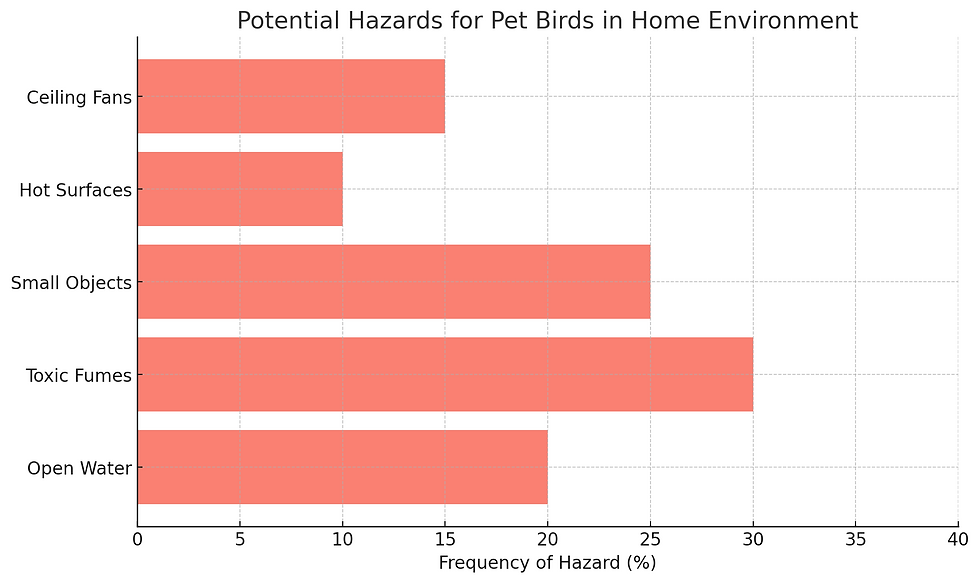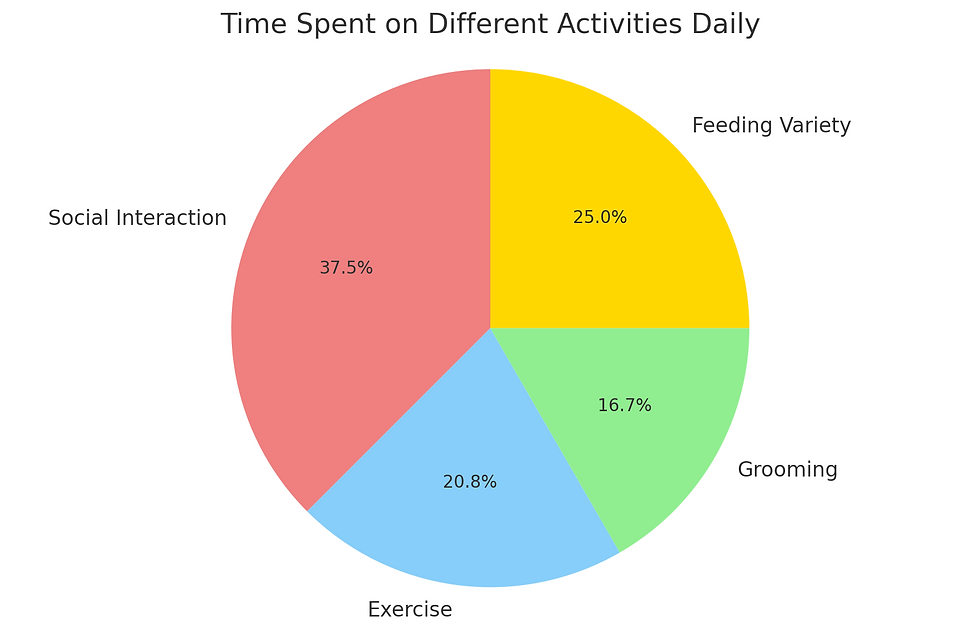Daily Care Tips for Pet Birds
- Saifur Rahman
- Jun 26, 2024
- 7 min read
Taking care of a pet bird involves a routine that ensures their health, happiness, and overall well-being. This guide provides essential daily care tips to keep your feathered friend in top condition.

Key Takeaways
Care Aspect | Tips |
Feeding | Provide fresh food and water daily. Include a variety of fruits, vegetables, and high-quality pellets. Avoid seed-only diets. |
Cage Maintenance | Clean the cage floor, change the cage liners, and ensure perches and toys are clean. |
Social Interaction | Spend time interacting with your bird to keep them mentally stimulated and prevent loneliness. |
Exercise | Allow your bird out-of-cage time in a bird-safe room. Provide toys and perches to encourage physical activity. |
Grooming | Offer opportunities for bathing through misting or a shallow dish of water. |
Feeding Your Pet Bird
Balanced Diet for Birds Proper nutrition is vital for the health of your pet bird. Fresh food and water should be provided daily. A balanced diet includes high-quality pellets, fresh fruits, and vegetables. Dark leafy greens, sweet potatoes, squash, and carrots are excellent choices. Avoid seed-only diets as they can lead to nutritional deficiencies.
For a comprehensive understanding of bird nutrition, check out Bird Nutrition.
Fresh Water Supply Ensure that your bird has access to clean, fresh water at all times. Replace the water daily and clean the water dishes regularly to prevent the growth of bacteria. This simple routine helps in maintaining your bird’s health and hygiene.
For more on basic bird care, visit Bird Care Basics.
Cage Maintenance
Daily Cleaning Routine Daily cleaning of the cage is essential to prevent the build-up of harmful bacteria and fungi. Replace the cage liner and clean the perches, food, and water dishes. A clean environment helps in maintaining your bird’s health and hygiene.
For tips on setting up and maintaining a bird cage, see Bird Cage Setup.
Safe and Comfortable Perches Providing a variety of perches made from different materials such as wood, rope, ceramic, and cement is important. This variety helps in preventing foot sores and keeps your bird comfortable. Birds use perches for standing, sleeping, climbing, cleaning, and chewing, so ensure they have a good grip.
Explore more about bird accessories at Bird Accessories.

Social Interaction
Importance of Companionship Birds are social creatures and require daily interaction to stay happy and mentally stimulated. Spend time talking to and handling your bird. This social interaction helps prevent behavioral issues like feather plucking and aggression. Training sessions can also be a great way to bond with your bird and keep their mind active.
Learn more about socializing with your bird at Socializing Pet Birds.
Training and Enrichment Training your bird can provide mental stimulation and strengthen your bond. Use a variety of toys, such as foraging toys, chewable toys, exercise toys, and foot toys, to keep your bird entertained and physically active.
For detailed information on bird toys and enrichment, visit Bird Toys & Enrichment.
Exercise and Freedom
Out-of-Cage Time Exercise is crucial for a bird’s physical health. Allow your bird to fly in a safe, bird-proofed room for some time each day. Providing a variety of toys and perches in the cage encourages natural behaviors like climbing, chewing, and playing, which are important for physical and mental well-being.
For more information on bird behavior and exercise, visit Bird Behavior.
Physical Activities In addition to out-of-cage time, it's essential to provide physical activities within the cage. Include swings, ladders, and climbing toys to promote exercise. These items help stimulate your bird’s natural instincts and keep them active. Rotate toys regularly to prevent boredom and maintain interest.

Grooming and Health
Regular Bathing Regular grooming is necessary to keep your bird’s feathers in good condition. Many birds enjoy bathing, which can be facilitated by misting them with water or providing a shallow dish for them to bathe in. Ensure the bathing water is clean and free from any soap or chemicals. Birds that are clean and well-groomed are generally healthier and happier.
Learn more about grooming your bird at Bird Grooming.
Health Monitoring Monitoring your bird’s health is crucial. Pay attention to their droppings, behavior, and overall appearance. Any changes could indicate health issues. Regular veterinary check-ups are essential to catch any potential problems early and ensure your bird stays healthy.
For a comprehensive guide on bird health and diseases, visit Bird Health & Diseases.

Safety Precautions
Bird-Proofing Your Home While cats and dogs typically have free reign of their homes, the same can’t be said for birds. Many household hazards could severely injure or even kill your avian pets, so it’s important to bird-proof your space before bringing one home. This includes closing blinds and curtains, rolling up cords, closing toilet seats, turning off radiators, closing any open fireplaces, turning off ceiling fans, and putting away household plants.
For more on legal and safety considerations, see Legal Considerations.
Avoiding Toxic Substances Birds have very sensitive respiratory systems, so any scented products, like candles, wax melts, air fresheners, and perfumes, should not be used. This also includes cigarette smoke and household cleaners. Ensure that non-stick cookware (which can emit toxic fumes when overheated) is not used around birds.
Explore more on bird health and potential hazards at Bird Health & Diseases.
Handling and Socialization
Importance of Companionship Birds are inherently social creatures and thrive on interaction. It is essential to spend quality time with your bird daily. This social interaction helps to prevent behavioral issues such as feather plucking, screaming, or aggression. Birds see their human caregivers as part of their flock, and neglecting their need for companionship can lead to loneliness and depression.
Training and Enrichment Training your bird is not only beneficial for their mental stimulation but also strengthens your bond with them. Use positive reinforcement techniques to teach your bird new tricks and commands. Incorporate a variety of toys to keep your bird entertained. Foraging toys, chewable toys, exercise toys, and foot toys are great for keeping your bird mentally and physically active.
For more details on bird training tips, visit Bird Training Tips.
Hygiene and Health
Feather Care and Bathing Regular baths help keep your bird’s feathers clean and healthy. You can mist your bird with water, provide a shallow dish for bathing, or even let them join you in the shower with a shower perch. Bathing helps remove dust and dirt, and it moisturizes the bird's skin. For species like cockatoos and African Greys, which tend to produce more dust, regular bathing is even more crucial.
Check out more about grooming at Bird Grooming.
Claw and Beak Maintenance Birds naturally wear down their claws and beaks through regular activities, but they may still need occasional trimming. Provide various perches to help keep their claws trimmed naturally. If necessary, a vet can trim them. Monitoring the beak and claws for overgrowth or abnormalities is an essential part of your bird's health care routine.
Environmental Enrichment
Cage Setup Ensure that your bird's cage is spacious enough for them to move around comfortably and spread their wings. The cage should be placed in a location where your bird can interact with the family but also retreat for quiet time when needed. Include a variety of perches, toys, and feeding stations to create a stimulating environment. Rotate toys regularly to keep your bird engaged and interested.
Explore more on setting up a bird-friendly environment at Bird Cage Setup.
Safety Measures Bird-proofing your home is critical to ensure your bird’s safety when they are out of their cage. Keep windows and doors closed, remove toxic plants, and ensure there are no small objects that your bird could swallow. Be mindful of hazards such as ceiling fans, hot stoves, and open water sources like toilets and sinks.
Learn more about creating a safe environment at Bird Owner Community.
Routine and Consistency
Establishing a Routine Creating a consistent daily routine for your bird is essential for their well-being. Birds thrive on predictability and can become stressed if their routine is disrupted. Ensure that feeding, cleaning, social interaction, and out-of-cage time happen at roughly the same times each day. This consistency helps your bird feel secure and well-cared for.
For more tips on establishing a routine, visit Bird Care Basics.

Health and Veterinary Care
Regular Health Checks Regular health checks are crucial for early detection of potential health issues. Look for changes in behavior, appetite, droppings, and physical appearance. Regular veterinary check-ups are essential to ensure your bird remains healthy. Avian veterinarians can provide specialized care tailored to your bird’s needs.
Common Health Issues Be aware of common health issues such as respiratory problems, feather plucking, and nutritional deficiencies. Immediate attention and treatment from a qualified vet can prevent minor issues from becoming serious. Keep a list of emergency contacts, including your avian vet’s details, in case of any urgent health concerns.
Final Thoughts
Monitoring and Adjusting Care Regularly review and adjust your care routine based on your bird’s behavior and health. Birds can be sensitive to changes, so any adjustment should be gradual and carefully monitored. Keep a journal to track your bird’s habits, diet, and health indicators. This can be helpful for both daily care and veterinary visits.
Resources and Community Join bird care communities and forums to share experiences and get advice from other bird owners. These communities can provide valuable insights and support. Additionally, numerous resources are available online for further learning about specific bird species and their care needs.
Visit Bird Owner Community for more information and support.
By following these daily care tips, you can ensure your pet bird remains healthy, active, and happy. Regular care, combined with a loving environment, will help your bird thrive and enjoy a long, fulfilling life.
People Also Asked
What is the best diet for pet birds? A balanced diet for pet birds includes high-quality pellets, fresh fruits, and vegetables. Avoid seed-only diets as they can lead to nutritional deficiencies.
How often should I clean my bird’s cage? Clean your bird’s cage daily by replacing the cage liner and cleaning food and water dishes. Deep clean the cage weekly to prevent the build-up of bacteria and fungi.
How can I make my bird happy? Spend quality time with your bird daily, provide a variety of toys, ensure they get plenty of exercises, and maintain a consistent routine.
What toys are best for pet birds? Foraging toys, chewable toys, exercise toys, and foot toys are excellent choices. Rotate toys regularly to keep your bird engaged.
How do I know if my bird is healthy? Monitor your bird’s droppings, behavior, and physical appearance. Regular veterinary check-ups are essential for early detection of potential health issues.
By incorporating these daily care practices into your routine, you can ensure that your pet bird remains healthy, happy, and well-cared for. For more information on specific aspects of bird care, explore the linked articles on our website.



Comments